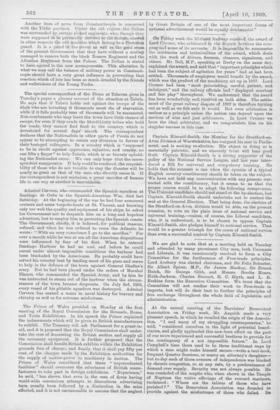Admiral Cervera„ who commanded the Spanish squadron at Santiago de
Cuba in the Spanish-American War, died last Saturday. At the beginning of the war he had four armoured cruisers and some torpedo-boats at St. Vincent, and knowing only too well the quality and equipment of his ships, he asked his Government not to despatch him on a long and hopeless adventure, but to employ him in protecting the Spanish coasts. The Government, chiefly, it is believed, for political reasons, refused, and when he was ordered to cross the Atlantic ho wrote: "With an easy conscience I go to the sacrifice." For over a month while he was at sea all the American dispositions were influenced by fear of his fleet. When he entered Santiago Harbow he had, no coal, and before he could rowel under almost impossible conditions the harbour had been blockaded by the Americans. He probably could have setved his country best by landing most of his guns and crews to help in the defence of the town against General Shafter's army. But he had been placed under the orders of Marshal Blanco, who commanded the Spanish Army, and by him he was instructed to steam out of the harbour when the circum- stances of the town became desperate. On July 3rd, 1898, every vessel of his pitiable squadron was destroyed. Admiral Cervera has earned a name in naval history for bravery and chivalry as well as for extreme misfortune.






































 Previous page
Previous page